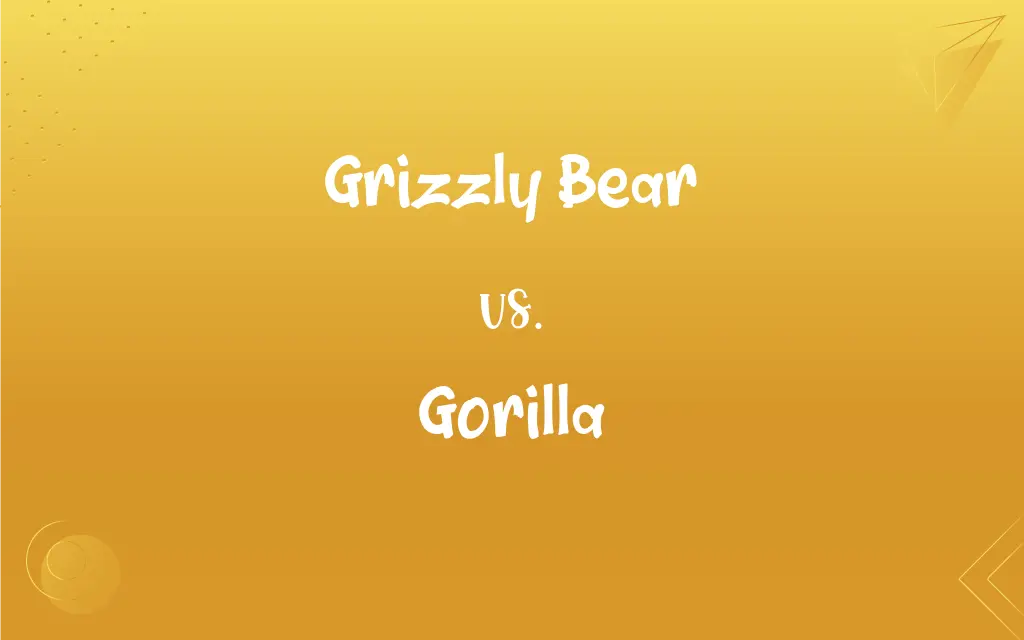Grizzly Bear vs. Gorilla: What's the Difference?
Edited by Aimie Carlson || By Harlon Moss || Published on November 22, 2023
Grizzly bears are large, North American brown bears, known for their humped shoulders and aggression; gorillas are large, primarily African primates, known for their intelligence and social structure.

Key Differences
Grizzly bears are massive, with a distinct hump on their shoulders and long claws, adapted for digging and catching prey. Gorillas, on the other hand, are the largest living primates, known for their immense strength, broad chests, and long arms, suited for their primarily terrestrial and knuckle-walking lifestyle.
Grizzly bears predominantly inhabit North American regions, particularly in forests, mountainous areas, and meadows. Gorillas, in contrast, are native to African forests, primarily dwelling in lowland tropical rainforests and montane forests.
Grizzlies are omnivores, with a diet varying from fish, mammals, and carrion to roots, berries, and fungi. Gorillas, conversely, are mostly herbivorous, feeding on leaves, stems, fruits, and sometimes insects, reflecting their different ecological roles.
Grizzly bears are solitary except during mating seasons or when females are with cubs. Gorillas live in stable social groups, led by a dominant silverback, exhibiting intricate social interactions and strong familial bonds.
Both species face threats from habitat loss and human activities. Grizzly bears are considered a conservation success story in some regions, while gorillas are critically endangered in others, reflecting varying conservation challenges and efforts.
ADVERTISEMENT
Comparison Chart
Classification
Mammal, Ursidae family
Mammal, Hominidae family
Primary Habitat
North American forests and mountains
African tropical and montane forests
Diet
Omnivorous, includes plants and meat
Herbivorous, primarily plant-based
Social Structure
Solitary except for mothers with cubs
Social, live in groups led by a silverback
Conservation Status
Varied, some populations recovering
Mostly endangered, facing habitat loss
ADVERTISEMENT
Grizzly Bear and Gorilla Definitions
Grizzly Bear
A large North American bear with a distinctive hump on its shoulders.
The grizzly bear roamed the mountainous region, searching for food.
Gorilla
Known for their intelligence, social structure, and human-like behaviors.
The gorilla used a stick to gauge the depth of the water.
Grizzly Bear
Known for its brown fur, which can appear grizzled or silver-tipped.
The grizzly bear's fur glistened in the sun, revealing its unique grizzled texture.
Gorilla
Primarily herbivorous, feeding on a variety of plant matter.
The gorilla munched on leaves, a staple of its diet.
Grizzly Bear
A subspecies of the brown bear, primarily found in western North America.
Grizzly bears are a symbol of the wilderness in western North America.
Gorilla
Endangered species, with habitat loss and poaching as major threats.
Conservation efforts are crucial to protect the endangered gorilla.
Grizzly Bear
An omnivorous mammal, adept at both hunting and foraging.
The grizzly bear skillfully caught salmon from the river.
Gorilla
Lives in groups led by a dominant male known as a silverback.
The silverback gorilla led its group through the forest with authority.
Grizzly Bear
Known for its solitary nature, except for females with cubs.
A solitary grizzly bear wandered the forest, far from any human settlements.
Gorilla
The largest living primate, native to African forests.
A gorilla sat contemplatively in the dense jungle underbrush.
Gorilla
Either of two large apes (Gorilla gorilla or G. beringei) native to the forests of equatorial Africa, having a stocky body and coarse dark brown or black hair.
Gorilla
A powerfully built, aggressive, and often crude man.
Gorilla
A thug.
Gorilla
The largest of the apes, belonging to the genus Gorilla, native to the forests of central Africa and known for their trait of knuckle-walking.
Gorilla
A big and brutish man or a thug; a goon or ruffian.
Gorilla
(informal) A powerful person or organization; a heavyweight or behemoth.
Gorilla
A large, arboreal, anthropoid ape of West Africa. It is larger than a man, and is remarkable for its massive skeleton and powerful muscles, which give it enormous strength. In some respects its anatomy, more than that of any other ape, except the chimpanzee, resembles that of man.
Gorilla
Largest anthropoid ape; terrestrial and vegetarian; of forests of central west Africa
FAQs
What distinguishes a grizzly bear's appearance?
Grizzly bears have a distinct shoulder hump, long claws, and often grizzled, silver-tipped fur.
What do grizzly bears eat?
They are omnivores, eating a mix of plants, fish, and small mammals.
What is the typical habitat of a grizzly bear?
They are found in North American forests, mountainous regions, and meadows.
Where do gorillas primarily live?
They inhabit African tropical and montane forests.
How fast can a grizzly bear run?
They can run up to 35 miles per hour in short bursts.
How are grizzly bear populations faring?
Their status varies; some populations are stable or increasing, while others are at risk.
Are grizzly bears aggressive?
They can be, especially when surprised or protecting cubs.
Are there different species of gorillas?
Yes, including the Eastern and Western Gorilla, with several subspecies.
Are grizzly bears solitary animals?
Yes, except for mothers with cubs and brief interactions during mating seasons.
What are the main features of a gorilla?
Gorillas are large primates with broad chests, long arms, and intelligent expressions.
Can grizzly bears climb trees?
Young bears can climb trees, but adults are typically too heavy.
What is a gorilla's diet?
Mostly herbivorous, eating leaves, stems, and fruits.
How do gorillas socialize?
They live in groups led by a silverback, with complex social interactions.
How do gorillas communicate?
Through vocalizations, body language, and facial expressions.
Do grizzly bears hibernate?
Yes, they hibernate in dens during winter months.
How long do grizzly bears live?
In the wild, they can live 20-25 years.
How intelligent are gorillas?
Very intelligent; they use tools, communicate, and show complex emotions.
How strong is a gorilla?
They are incredibly strong, with the ability to lift over 10 times their body weight.
What are the major threats to gorillas?
Habitat loss and poaching are significant threats to their survival.
Can gorillas swim?
No, unlike many primates, gorillas cannot swim.
About Author
Written by
Harlon MossHarlon is a seasoned quality moderator and accomplished content writer for Difference Wiki. An alumnus of the prestigious University of California, he earned his degree in Computer Science. Leveraging his academic background, Harlon brings a meticulous and informed perspective to his work, ensuring content accuracy and excellence.
Edited by
Aimie CarlsonAimie Carlson, holding a master's degree in English literature, is a fervent English language enthusiast. She lends her writing talents to Difference Wiki, a prominent website that specializes in comparisons, offering readers insightful analyses that both captivate and inform.































































